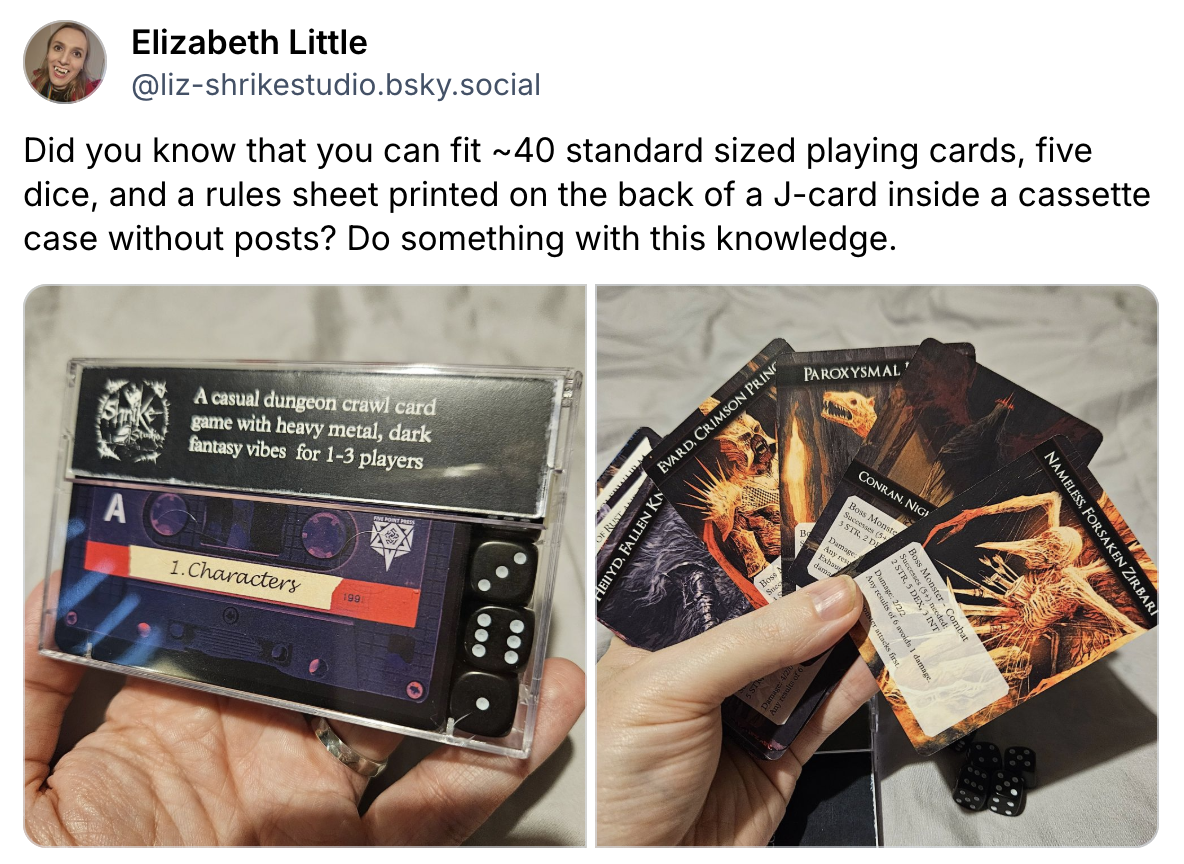Devlog 1: Origin, format, structure, and developing the basics
Hi there! I dropped VOID_SHIFT off a little while ago without really explaining what it is properly. What if, instead of doing that, I explained it properly?

Now that physicals are coming soon - I just need a few more components of the packaging to arrive, then some assembly, then we’re off to the races - let’s back up and try to do that.
Origin
A handful of things prompted me to make this.
First off, a few posts. Screenshotted below:



These ideas just went together like peanut butter and jelly in my mind. So we had an idea (little solo deckbuilder) and a format that seems to suit it really well (about 40 cards and five dice in a cassette)! But what to make?
I had just played Citizen Sleeper 2 and was really enjoying the Contracts These are time-limited repair jobs - they’re tense things that involve no combat, just “can you do the job in time” and “how much are you willing to push yourself and your crew to get there”.
I had especially been thinking about it because I have another game about people working shitty jobs in space, NULL_SPACE, on the way. (Go here and smash that button to be notified when it comes out!) For awhile it was titled “NULL_SPACE card game idea”. Eventually I settled on VOID_SHIFT as the name: VOID because it’s still got that NULL_SPACE idea in there, and SHIFT is there because, well, it’s about work! And crucially, it fits exactly in the same wordmark format because it’s 4 letters -> underscore -> 5 letters.
So with that, I had the full package all together: what if I made a little deckbuilder where you try to fix something on a clock? Make the crew you bring your deck and that’s that. Sounds great.
High level implementation
So we’ve got ~40 cards - and while prototyping and looking up how card printing works I landed on 36 as the actual number of cards to target. I was really fixated on that CS2 Contract idea, so my thought was to subdivide those into deck cards and scenario cards - the cards you build the deck with vs. the cards that tell you what you’re doing. From that, I ended up with 30 deck cards and 6 scenarios just because it creates some nice round numbers in both cases. To provide enough cards that decks could be meaningfully different, I decided I’d go with half of that. So, that became the format: you make a 15 card deck from those 30.
I had committed to using 6-sided dice. Dice are great as either counters or rolling, so I decided to try and do both.
Structure
I loved the “cycle” structure in CS1/2: it’s basically a day, every day you get a new set of dice to assign. We have 6-sided dice at our disposal, so I went with 6 days. Each day you tick the die down, once it ticks down from 1 you lose. Easy.
Shifts were a little harder to pin down. I had the idea from the start of “draw X cards” but had to playtest it awhile to figure out how many felt right in a day. At some point along the way, I decided on “draw 5, play 3” because I don’t have resources as such and didn’t want to add them for simplicity reasons, so I had to put some kind of limit on it to provide any semblance of tactical choice. Initially I had this as something that was kind of implicit - you would draw 5 cards at the start of a Shift, and whenever you had 0 cards in your deck your day was over at the end of that turn. This got weird real quick because there quickly established an odd thing where you wanted to put cards on top of your deck because it would effectively extend a day and card draw would actually kind of punish you for that same reason - something that would close off quite a few avenues going forward. Also at a certain point “some days have more shifts than others if you do it right” stretches the metaphor a little further than I’d like, and it’s already a little stretched. So eventually I just settled on 3 Shifts.
Basic task completion
Citizen Sleeper 1 and 2 represent subtasks of a job with clocks. You chip away at them, typically by either taking riskier actions that threaten the character or the job OR by taking safer actions that don’t do it as quickly. Once one’s done, others open up, or sometimes two different ones can both do the same job. So that was a good model from the jump: use dice as counters, tick them down when work is done.
As noted, we’re using our deck as the crew, and crew members having things they’re good at was a crucial part of CS2! Rather than going for attributes, though, I subdivided them between Mechanical, Electrical, Chemical, and Software. There’s an instrumentality to treating crew members as tools that jives well with the tone of the game, so that end-layer expression being purely a matter of “what kind of work can they provide” was the intent.
As mentioned, I wanted to see if we could incorporate rolling, so I devised a very simple roll-under: each character has certain values, when they go to work you try to roll less than or equal to the value, if you do then the work is done. Great.
Exhaust and Decommission
I decided I wanted to get that “stress” idea in there too, though - and besides, I was going to need a few layers of complexity to make a deckbuilder make any sense. I figured “if you roll under, it happens” was sensible enough as a trend, so I added in Exhaust too - roll under that number as well and the crew member gets worn out. So with a few exceptions (i.e. where Exhaust is greater than or equal to the skill) you end up with a ternary system on each roll of “failure”, “success”, and “success with a drawback”, which I assume nobody has ever done before.
Exhaust was going to happen all the time, so I made that synonymous with discard. In Magic terms, this is like sending it to the graveyard but if you re-shuffled your entire deck every 3 rounds. I did also want something more permanent in the design space, though, so I reserved the idea of Decommission as an Exile-equivalent: something separate and a bit more permanent. It lasts until the end of the game and can’t under most circumstances be undone.
Obviously this alone does not a deckbuilder make. So once the brass tacks were nailed down and it more or less worked, I started thinking about how to add the building bit of deckbuilding in, and to spice things up from the scenario side as well.
But both of those are a topic for another devlog.
Get VOID_SHIFT
VOID_SHIFT
Assemble your deck and don't get fired.
| Status | Released |
| Category | Physical game |
| Author | Binary Star Games |
| Genre | Card Game |
| Tags | Sci-fi |
More posts
- Devlog 2: Jobs, Decks, and Difficulty73 days ago

Leave a comment
Log in with itch.io to leave a comment.